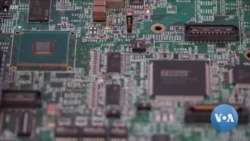Japan imposed export controls on advanced microchip technologies this week in a move widely seen as targeting China, mirroring recent restrictions imposed by the United States and the Netherlands, two other major producers of cutting-edge semiconductors.
Tokyo listed 23 types of semiconductor technology that are now subject to export restrictions, beginning July 23. They include advanced microchip manufacturing equipment, such as machines that deposit films on silicon wafers, to devices that etch out the microscopic circuits of chips.
The controls will affect China’s ability to make advanced chips, analyst Yoshiaki Takayama of the Japan Institute for International Affairs in Tokyo said.
“The Japanese measure complements U.S.-led export control measures because the number of companies with the capacity to manufacture cutting-edge chips is extremely limited,” Takayama told VOA in an interview Wednesday. “The Japanese measure makes it difficult for China not only to import advanced chips, but also to manufacture them.”
He added that Beijing appears to be shifting its semiconductor strategy by focusing on middle- and low-end semiconductor manufacturing rather than cutting-edge semiconductor manufacturing.
Western controls
The United States banned the export of some advanced microchips and semiconductor manufacturing technology to China in October and urged Western allies to follow suit. The Netherlands — another key producer of semiconductors — imposed similar measures in June. Taiwan has also pledged to support Washington’s move.
The U.S, says it wants to stop Beijing using the technology for military purposes.
At the G7 summit in Japan in May, allies agreed on the need to "de-risk" from potential Chinese economic coercion and avoid becoming reliant on China for semiconductor technologies.
These combined measures will severely affect China’s ability to keep up with Western technology, Takayama said, hurting its ability to manufacture state-of-the-art semiconductors and increase its manufacturing capacity in the short to medium term.
“Unlike the traditional mechanical technology industries, where reverse engineering has produced important technological learnings, reverse engineering does not produce useful knowledge in the semiconductor manufacturing sector,” Takayama said.
“Moreover, today’s scientific progress is largely due to big data analysis and simulations rather than repeated trial and error. So, it seems that China, with its limited access to cutting-edge semiconductors, could fall behind in scientific and technological R&D,” he told VOA.
Unlike the United States and the Netherlands, Japan did not name China as the target of its export restrictions, which apply to 160 countries. However, Beijing still reacted with anger.
“In disregard of China's serious concerns, Japan insisted on making and implementing export control measures that are clearly aimed at China. … We will closely monitor the impact of measures and resolutely safeguard our own interests.”” Mao Ning, a spokesperson for the Chinese Foreign Ministry, told reporters July 24.
In a retaliatory move, China banned the import of semiconductors from the American firm Micron in May, citing national security concerns. Some firms in Japan fear Beijing will seek to restrict their imports, Takayama said.
“Such Chinese measures could be against individual Japanese companies, as in the case of the sanctions against Micron, or Beijing might restrict trade with Japan for specific products,” he told VOA.
Analysts say it is vital that Western allies coordinate their export controls. The U.S. is expected to update its list of banned semiconductor technologies in coming weeks.








